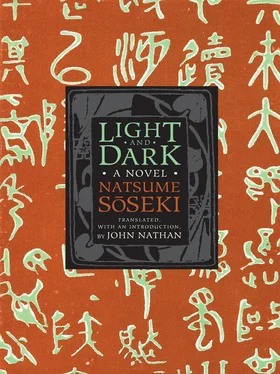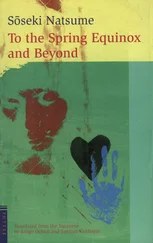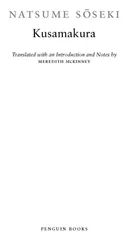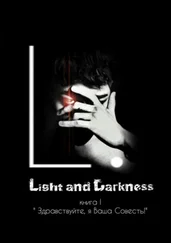21. In his preface to the Iwanami paperback edition of the novel, Ōe Kenzaburō reminded “contemporary and particularly young readers” that the influence exerted by relatives in Japanese social life and personal relationships was “decisively more powerful in the Meiji and Taisho periods than it is today” (Natsume Sōseki, Meian [Tokyo: Iwanami Shoten, 2010], 599).
22. Japanese readers tend to object heatedly to this interpretation. As evidence that Sōseki did not intend any particle of doubt about Tsuda’s condition, they cite two lines of text (emphasis mine in both): “About to explain that his doctor’s specialty was in an area somewhat tangential to his particular illness and that as such his offices were not the sort of place that ladies would find inviting” (12:46); and “ Supposing that Tsuda was afflicted with the same sort of illness as his own, [his friend] had spoken up without any hesitation or reserve, as if to do so were perfectly natural” (17:54). In fact, the second sentence contains its own ambiguity. The verb I have translated as “supposing” ( omoikomu ) means “to assume something, sometimes — but not always — mistakenly.” To be sure, both lines may be read as negating the possibility that Tsuda suffers from a venereal disease. At the same time, it seems obvious that at the very least Sōseki is playing them contrapuntally against seeds of doubt that he has intentionally planted.
23. Ōe, Saigo no shōsetsu , 170–71.
24. Ōoka Shōhei, Shōsetsuka Natsume Sōseki (Tokyo: Chikuma Shōbō, 1988), 425–29.
25. Kumegawa Mitsuki, Meian Aru Shūshō (Tokyo: Ronsōsha, 2009); Tanaka Fumiko, Natsume Sōseki Meian no Dabi (Tokyo: Tōhōshuppan, 1991); Mizumura Minae, Zoku Meian (Tokyo: Chikuma Shōbō, 1990); Nagai Ai, Shin Meian (Tokyo: Jiritsu Shobō, 2002).
26. Mizumura, Zoku Meian , 260, 261.
A Note on the Translation
 IN HIS first response to a list of questions that I had sent him, a Sōseki scholar in Tokyo wrote: “Rereading the passages you have marked, I find they contain difficult problems that cannot be answered simply. Your questions have led me to the realization that the text of Light and Dark , read closely, is even for me a universe of complex language not easily fathomed.” I was surprised by this but also reassured to think that the difficulty I was having as a reader was not altogether due to inadequate command. Over time I consulted others, observed them shaking their heads, and began to feel comfortable with the conclusion that Sōseki’s language in Light and Dark is after all a challenge to understand even for literate native readers. To be sure, there are moments when the interior landscape emerges in lucid focus as though bathed in early morning light; at other times, the reader must hold on for dear life as Sōseki descends through the murkiness toward the depths he is seeking.
IN HIS first response to a list of questions that I had sent him, a Sōseki scholar in Tokyo wrote: “Rereading the passages you have marked, I find they contain difficult problems that cannot be answered simply. Your questions have led me to the realization that the text of Light and Dark , read closely, is even for me a universe of complex language not easily fathomed.” I was surprised by this but also reassured to think that the difficulty I was having as a reader was not altogether due to inadequate command. Over time I consulted others, observed them shaking their heads, and began to feel comfortable with the conclusion that Sōseki’s language in Light and Dark is after all a challenge to understand even for literate native readers. To be sure, there are moments when the interior landscape emerges in lucid focus as though bathed in early morning light; at other times, the reader must hold on for dear life as Sōseki descends through the murkiness toward the depths he is seeking.
This is particularly the case in the narrative passages that the Japanese call “psychological description.” Sōseki assigns to words idiosyncratic, deeply personal connotations, and his syntax can be not so much tortuous as indeterminate: sentences aggregate into passages that point toward meaning without ever quite arriving. In this final novel, Sōseki appears to be experimenting, taxing his language with a mode of description unfamiliar to him, intentionally deranging his masterly prose, and the result must be deemed uneven, now brilliantly exact and now opaque.
I should interject that the dialogue, so copious that this novel sometimes reads like a play, is even more compelling than his usual: ironically witty, pitch-perfect, richly revealing character. The superlative aliveness of the book’s conversations — an aliveness that throbs beneath the surface of a maddening placidity — is in itself enough to make them difficult to translate acceptably. There is, moreover, the challenge of creating the patina of age that a novel written 100 years ago will have acquired for the native reader, a coloration that rarely survives in a translation. The extended family in Light and Dark , lambasting one another and revealing themselves in the process, converses in the language of the haute bourgeoisie of 1916. Formulating a notion, however vague, of how this sounded to Japanese readers at the time and how it strikes the ear of the native reader today was critical, and that left me with the struggle to create this subtle verdigris in my English dialogue. I should mention that I had recourse to Henry James in my attempt to “cure” the translation, harvesting from his pages words and turns of phrase that struck me as redolent of the period in which Light and Dark occurs.
To return to the narrative that prefaces and reflects on the dialogue, Light and Dark confronts the translator with a twofold challenge. I have suggested the difficulty I experienced comprehending passages in the text. But arriving with some certainty at what Sōseki intended to say was only the beginning. Should I translate the language I had managed to decipher paraphrastically, taming it for the benefit of the English reader? Or must I labor to render it in English as resistant to easy comprehension as the Japanese original? The latter course was dictated by my fundamental view of the translator’s task: to provide the reader in English with an experience equivalent to what the native reader experiences in Japanese. But that far more difficult approach, even assuming I possessed the craft to achieve it, would require the courage to fly in the face of the reader’s expectation that translations should proceed “smoothly.”
The centripetal power of this expectation should not be underestimated — it is at least partly responsible for the blandness of many literary translations — and I will not pretend that I never succumbed. Perhaps a single example will suffice. In the following lines, Tsuda reflects on a violent altercation with Kobayashi that he has imagined. The passage had baffled me, and when I showed it to an ardent Sōseki reader who is a novelist in her own right, she exclaimed, “This is horrendous! Shame on him!” First a literal rendering in English:
But his critique could not proceed beyond that point. Dishonoring himself vis-à-vis another person, if ever he should perpetrate such a thing how terrible that would be! This alone lay at the base of his ethical view. On closer inspection one had no choice but to reduce this to scandal. Accordingly, the bad guy was Kobayashi alone.
The following somewhat overarticulated version is from V. H. Viglielmo’s 1971 translation:
And yet his assessment of such a hypothetical scene could not go beyond that point. If ever he should lose face in front of others, it would be dreadful. This was all there was at the root of all his ethical views. If one tried to express this more simply, one could reduce it to the simple fact that he feared scandal. Therefore the only person in the wrong would be Kobayashi.
As for me, in the light of conjecture offered by the native readers I consulted, I settled on the following:
But he was unable to develop his critique beyond this. To disgrace himself in the eyes of others was more than he could contemplate. Saving face was the fundament of his ethics. His only thought was that appearances must be preserved, scandal above all avoided. By that token, the villain of the piece was Kobayashi.
I am confident that this is what Sōseki intended, but inasmuch as it offers no resistance to interpretation it represents a compromise. Not that I always acquiesced to the pressure to domesticate the translation. On the contrary, I labored to preserve in my English the varieties of difficulty I perceived in Sōseki’s Japanese.
Читать дальше

 IN HIS first response to a list of questions that I had sent him, a Sōseki scholar in Tokyo wrote: “Rereading the passages you have marked, I find they contain difficult problems that cannot be answered simply. Your questions have led me to the realization that the text of Light and Dark , read closely, is even for me a universe of complex language not easily fathomed.” I was surprised by this but also reassured to think that the difficulty I was having as a reader was not altogether due to inadequate command. Over time I consulted others, observed them shaking their heads, and began to feel comfortable with the conclusion that Sōseki’s language in Light and Dark is after all a challenge to understand even for literate native readers. To be sure, there are moments when the interior landscape emerges in lucid focus as though bathed in early morning light; at other times, the reader must hold on for dear life as Sōseki descends through the murkiness toward the depths he is seeking.
IN HIS first response to a list of questions that I had sent him, a Sōseki scholar in Tokyo wrote: “Rereading the passages you have marked, I find they contain difficult problems that cannot be answered simply. Your questions have led me to the realization that the text of Light and Dark , read closely, is even for me a universe of complex language not easily fathomed.” I was surprised by this but also reassured to think that the difficulty I was having as a reader was not altogether due to inadequate command. Over time I consulted others, observed them shaking their heads, and began to feel comfortable with the conclusion that Sōseki’s language in Light and Dark is after all a challenge to understand even for literate native readers. To be sure, there are moments when the interior landscape emerges in lucid focus as though bathed in early morning light; at other times, the reader must hold on for dear life as Sōseki descends through the murkiness toward the depths he is seeking.









